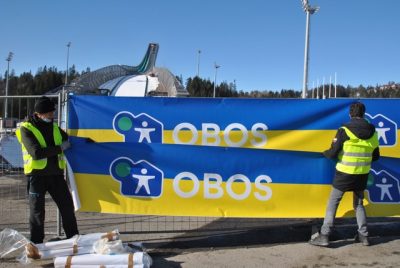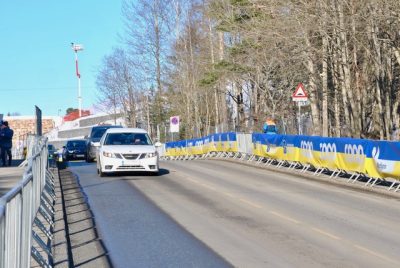NEWS ANALYSIS: The contrast could hardly be greater: Norwegian athletes were warned to avoid any criticism of China’s authoritarian regime or human rights violations during the recent Winter Olympics in Beijing, for fear they’d be disqualified or even jailed. At this weekend’s World Cup competition at Holmenkollen in Oslo, however, Russia’s athletes had to travel home and Ukraine’s colours were prominently displayed, even on the athletes themselves.

“We want to mark our broad support for Ukraine,” Erik Røste, president of Norway’s national skiing federation NSF, had told newspaper Dagsavisen before competition began, first with a sprint in Drammen on Thursday and then through the weekend at Holmenkollen.
Russian athletes were nowhere to be seen, after NSF claimed they were unwelcome, wouldn’t let them participate and ultimately won backing for that from the international ski federation FIS. The Russians packed up and left, frustrated and disappointed that their season was disrupted because Russian President Vladimir Putin had invaded and launched widespread attacks on Ukraine.
Sponsors of the Holmenkollen Ski Festival, meanwhile, added to the highly visual support for Ukraine, with grocery store chain Coop and homebuilder OBOS among those blanketing the arenas and lining the trails with banners in Ukraine’s colours. Athletes’ start numbers were also emblazoned over the colours of the Ukrainian flag. Spectators were urged to wear blue and yellow clothing and in Drammen, Ukrainian flags flew. The Holmenkollen Ski Jump itself, owned by the City of Oslo, has been bathed in blue and yellow lights all week.
Organizers claimed they wanted to send a clear message: “We see that there’s been a serious violation of the rule of law,” festival leader Stefan Marx told newspaper Aftenposten. “We must send a signal about that, also to the Ukrainian people.” He called Holmenkollen “a symbol of peace and democracy, and the right platform to do this,” adding neither he nor skiing federation officials had any second thoughts about displaying not only support for Ukraine but sharp criticism of Putin’s war in Ukraine.

Norwegian sports officials had vastly different thoughts about combining politics and sports when heading into the Olympics in Beijing. Norwegian athletes had actively sought clear statements from their leaders regarding China’s authoritarian regime and its destruction of democracy in Hong Kong, its human rights abuses against minorities and crackdowns on criticism. Several athletes had uttered criticism of their own, prompting Norwegian commentator Lars West Johnsen to claim that it would be “much more exciting to see who uses their right to freedom of expression than who wins gold.”
Chinese officials, meanwhile, had resorted to threatening athletes and warned of severe consequences such as disqualification or even prosecution if they dared to utter any criticism of protests against the regime during the Olympics. “All expression … in the Olympic spirit will be protected,” stated Yang Shu, deputy director of Beijing 2022’s division for international relations, “and anything, behaviour or expressions, that go against the Olympic spirit and especially Chinese laws and regulations, will be punished.” The International Olympic Committee (IOC), which has long tried to ban political statements at the games, didn’t step in to protect athletes’ rights to freedom of expression.
Norwegian athletics leaders ended up asking Norway’s skiers, ski jumpers, speed skaters and everyone else to avoid criticism of China until they came home. The athletes were under surveillance at all times, also because of strict anti-infection regimes in a country that has not become immune to the Corona virus, and they were effectively silenced. Norwegian officials themselves are routinely criticized in Norway for being far too reluctant to criticize China, for economic reasons.
This week has shown that Russia is getting much harsher treatment. Russia has, of course, invaded a neighbouring country and launched attacks that have shocked most of the world. Many view that as much worse than China’s attacks on and imprisonment of pro-democracy demonstrators in Hong Kong, its internment of China’s minority Uighurs or jailing of dissidents.

Symbolic protests against Russia and support for Ukraine were thus not only banned but encouraged at Holmenkollen during the weekend. Therese Johaug was wearing a blue-and-yellow armband when she won the women’s 30-kilometer race on Saturday and ended her professional skiing career. So was skier Maiken Caspersen Falla when she arrived in Drammen Thursday for the sprint.
“It’s important to show that we’re thinking about Ukraine and support them,” Falla told Aftenposten. After the TV team with rights for broadcasting in Russia went home before it all began, it was highly unlikely that any Russian viewers would see any it.
The legions of cheering fans for which Holmenkollen used to be famous, however, were much thinner than in earlier years. Holmenkollen itself had to play out without any spectators in 2020, when the Corora crisis first began, and was cancelled last year when the pandemic continued. This was supposed to be a grand and festive comeback for the event, only to be overshadowed by Putin’s war. Holmenkollen, especially the ski jumping event on Sunday, used to attract up to 100,000 fans or more, while this year only around 12,000 tickets were expected to be sold. There were also far fewer fans lining the ski trails during Saturday’s events.
Perhaps people are still skeptical about being in crowds since Omicron infection remains a challenge in Norway. Some clearly opted to instead march in the latest of a series of demonstrations in downtown Oslo against Russia’s invasion of Ukraine.
newsinenglish.no/Nina Berglund

